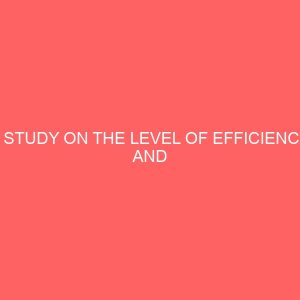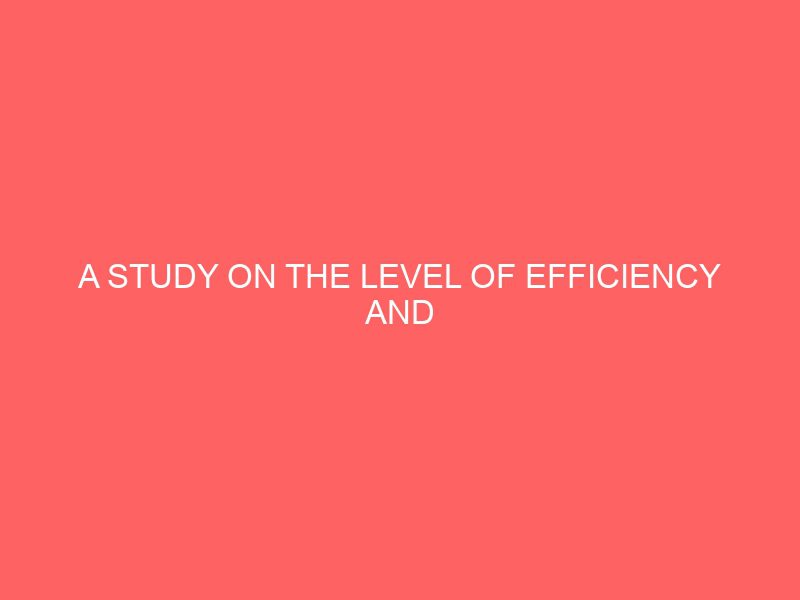Description
CHAPTER ONE INTRODUCTION 1.1 BACKGROUND OF THE STUDY Over the years, many organizations in Nigeria have been suffering from ineffective redundancy and unproductively following the inability of the management of such organizations to subject their enterprise to quality management. Increasing productivity and efficiency is a way of increasing the ability of people to do what they want, to do as well as achieving a higher standard of living for all suffering from low income and in boosting the prosperity of the overall Nigeria economy. Yesufu T.M. (1962) was of the view that productivity/efficiency can be defined as the ratio between output and all the resources used in production i.e. capital, labour, raw materials etc. the most efficient use of all available resources. With these definitions; one may ask why the Nigeria worker is inherently characterized by low-productivity/efficiency in spite of all government?s efforts to improve the economy and the ever increasing need for improved productivity/efficiency. The answer to this disturbing question is vital and will be answered and discussed in this study. The rate of society?s demand and the rate of inflation. Increased productivity and efficiency is very vital for the health of the country because it will help to improve the conditions of the environment, enhance security and improve the standard and quality of life of the citizens. This is why David Ricada in his study of population said that food needs to grow at a geometrical rate in order to meet the demand of the growing population. This emphasizes the need for increased productivity and efficiency. Declining productivity and efficiency in the Nigeria public sector has become a persistent concern of economic and business analysts over the past 5 years and as the decline continues so does the search for solutions (Bowman, 1994; Burnstein and Fisk, 2003; Balk, 2003). Dozens of organizations have attempted to solve their productivity/efficiency problems by application of various innovative management techniques (Balas, 2004). Some public sector agencies have implemented incentive programs in order to influence employee motivation and increase productivity/efficiency. 1.2 STATEMENT OF PROBLEM Nigerians have so much complained about a low productivity and efficiency of Nigerian workers in public establishment. Even workers themselves have also been worried about their own level of productivity/efficiency. Some of them believe if one?s output is high, it will motivate one much towards working harder and thereby increasing productivity and efficiency, as high output makes one to be satisfied. Nigerians cannot withstand the competition in the world market; this is also attributed to low- productivity/efficiency especially in the industries in the public sectors. This is because; most of the product used in Nigeria is manufactured by them. In other countries their level of technology is high so their productivity and efficiency is usually high and as such they do well in international market. It can now be seen that low-productivity and efficiency is a general issue in Nigeria public sector and also a big problem in Nigeria and it adversely affects the economy. Nigerians are faced with several hardships in the country. Low-productivity and efficiency of our industries is one of the notable causes of this. It makes cost of many products to be high as many people want to buy the few available products. This study will therefore examine the evaluation productivity and efficiency in the public sector of the Nigerian economy using the Ibadan Electricity Distribution Company. 1.3 PURPOSE/OBJECTIVES OF THE STUDY The depressing economic situation of things in our country led to the carrying out of this research as the bad economy can be attributable to low-productivity and efficiency in our industries. The purpose of this study is therefore to find out those factors which are responsible for low-productivity/efficiency in Nigeria workers especially in the public sector; from the findings the writer will recommend possible solutions. This will help our workers in the industries to increase their performance and thus help to improve the standard of living and the general economy of Nigeria. 1.4 SCOPE OF THE STUDY The scope of shall cover only the Ibadan Electricity Distribution Company. The study is concerned with factors responsible for low-productivity and efficiency in Nigeria workers in the public sectors and the ways of solving the problem. Measurement of productivity/efficiency in the business enterprises are relatively quite simple because of the existence of clear ? cut relationship between inputs and out- put. On the basis of the above, this research did not give much consideration to the problems relating to productivity/efficiency is not easily quantifiable. 1.5 RESEARCH QUESTIONS The following research questions have been designed to guide this study: – 1. What are the factors responsible for low productivity and efficiency in Nigeria workers in the public sector? 2. Is the level of productivity and efficiency of industries in the public sector important to the Nigerian economy? 3. What are the influences of productivity and efficiency in public sector on Nigerian economy? 4. What are the various ways of improving the productivity and efficiency of Nigerian workers in the Public sector? 1.6 SIGNIFICANCE OF THE STUDY This very study is aimed at examining those factors affecting workers? productivity and efficiency in the public sector. Therefore the result of this research will then do the following: 1. Potential consumers will benefit for they will be supplied with the products they want and their money?s worth satisfied. 2. The management will also benefit when there is improvement in productivity/efficiency of workers. 3. It makes for a rapid economic growth of the country. 4. Workers will also benefit through training and re-training scheme / programme. 5. The income?level and service requirement of the entrepreneur will improve. 1.7 LIMITATION OF THE STUDY 1. Network interconnectivity to enhance elaborate research ? 2. High level of illiteracy 3. Organization operational huddles. 4. Time and cost constraints due to cause of scarcity in gasoline to go about the research.







